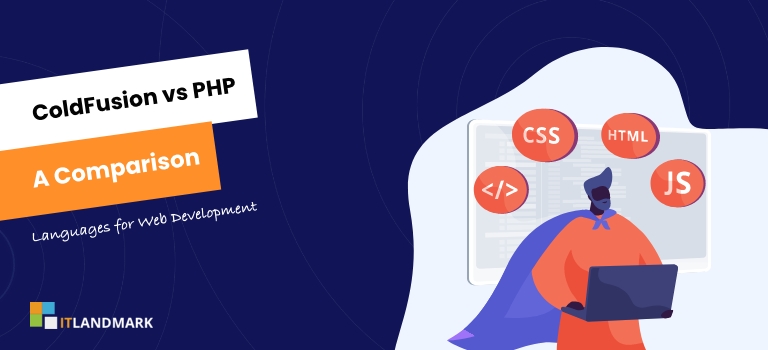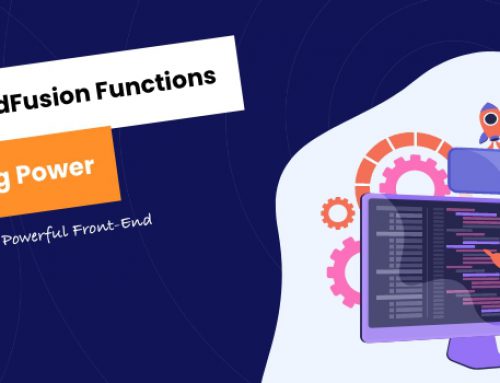
Are you looking for the perfect language for your web development project? With so many options available, it can be difficult to find the right fit. ColdFusion and PHP are both popular choices for web development, but how do they stack up against each other? In this article, we’ll explore each language’s capabilities, features, cost of development, ease of use, scalability and security as well as the pros and cons of each. We’ll also discuss support and resources available to developers using either language. By the end of this article, you should have a better understanding of which language is right for your project. Get ready to dig in and start comparing ColdFusion and PHP!
Table Of Contents
- Overview of ColdFusion and PHP
- Comparing ColdFusion Vs PHP
- Pros and Cons of CF and PHP
- Security
- Frequently Asked Questions
- Conclusion
Overview of ColdFusion and PHP
ColdFusion and PHP are two of the most powerful web-building tools out there; you can create absolutely stunning websites with either one, almost unbelievably quickly!
To understand the differences between them, it’s important to compare their functionality, language pros/cons, syntax basics, performance considerations, and popularity trends.
When comparing ColdFusion vs. PHP functionality, both languages are well known for being able to work with HTML or XML documents. ColdFusion also has additional features such as an easy-to-use graphical user interface (GUI) and a wide range of libraries that make coding more efficient. On the other hand, PHP is great at creating dynamic content that interacts with databases like MySQL.
As far as language pros/cons go, ColdFusion is often seen as easier to learn because its syntax isn’t overly complex – though this comes at the cost of some advanced capabilities not included in its basic functions. Conversely, many developers prefer PHP since it offers more sophisticated programming options than what’s available with CFML.
As for syntax basics, ColdFusion uses tags while PHP relies on braces and semi-colons – making it slightly easier for beginners to pick up without issue.
When considering performance considerations when building websites using either technology stack, both offer excellent scalability but may require tweaking depending on your specific requirements.
Lastly, popular opinion suggests that even though ColdFusion still holds its own among experienced coders today due to its ease of use/learning curve -PHP has become much more widespread over time particularly within younger generations looking to break into development fields.
Considering all these factors together then leads us logically towards understanding the different capabilities and features each provides…
Also Read: ColdFusion Vs Other Programming Languages
Comparing ColdFusion Vs PHP
Examining the capabilities and features of these two web-building technologies provides insight into their respective advantages for development.
ColdFusion and PHP both offer a wide range of syntax rules that are designed to make coding easier, as well as various debugging tools which can help developers troubleshoot any issue they may encounter quickly.
Moreover, each language has its own performance benchmarks that measure how efficiently code is written and executed on a server.
When it comes to database connectivity, both languages come with an array of options.
ColdFusion offers integration with Cloud databases such as Amazon Web Services (AWS) while PHP supports many open source solutions like MySQL or PostgreSQL.
As for industry trends, ColdFusion is becoming increasingly popular among large enterprises due to its scalability and security measures while PHP still reigns when it comes to smaller scale projects.
The ultimate decision between using either ColdFusion or PHP will ultimately depend on what type of project you’re building and the desired cost of development.
While one might be better suited for certain applications than the other, understanding their capabilities and features will provide insights into why this may be so.
Also Read:6 Most Useful Built-in ColdFusion Functions
1. Cost of Development
Regardless of the project you’re building, understanding the cost of development for both ColdFusion and PHP can help you make an informed decision.
Developer rates are often higher for those skilled in Cold Fusion due to its complexity; however, there is a relatively short learning curve for developing applications with either language.
Documentation quality varies depending on your platform choice, but it should be noted that compatibility issues may arise when using other languages to build apps with these frameworks.
As far as overall costs go, ColdFusion has more expensive licensing fees than PHP, so if budget is a major concern then this factor must be taken into consideration before committing to one framework over the other.
While cost certainly plays a role in which framework you choose, ease of use is another important factor that should not be overlooked.
2. Ease of Use
Evaluating the ease of use of both frameworks is a critical step in making an informed decision on which to utilize for your project.
ColdFusion and PHP have many differences when it comes to their learning curve, code readability, and code reuse.
The syntax between the two languages is quite different but easy enough to learn once you get used to them.
When it comes to platform compatibility, ColdFusion runs on Windows-based servers while PHP can run on Linux or Windows-based servers, allowing developers more flexibility in hosting options.
ColdFusion generally offers a shorter learning curve than that of PHP due to its simple tag structure and intuitive functions like cfcache and cfquery.
Its code is also relatively easier to read as compared to PHP since many of its tags are self explanatory – such as or.
Code reusability with ColdFusion is also much simpler since parts of the page can be called up from other pages using includes, templates, custom tags, user defined functions (UDF), etc.
Since most components are written in Java they can be simply reused across multiple applications hosted by the same server instance.
PHP does require some knowledge of HTML before you begin writing code; however once learned there are plenty of resources available online that will help newcomers become familiarized with the language quickly.
It has a slightly higher learning curve than ColdFusion because of its lack of built-in features where coding must take place within script blocks instead of HTML markup tags like we see in CFML.
Additionally, debugging errors may prove difficult if not done properly due to how variables behave differently depending on scope and context.
Despite this drawback, knowing one’s way around basic programming concepts should make mastering either framework fairly straightforward given the right amount dedication and time investment needed.
With these points considered side-by-side it becomes apparent that each language provides distinct advantages for web development projects regardless of size or complexity..
To evaluate scalability when comparing ColdFusion and PHP requires further exploration into both platforms’ abilities for handling larger workloads effectively and efficiently.
Also Read: ColdFusion Vs .NET
3. Scalability
When it comes to scalability, think of it like a mountain climb: you want to find the path that will allow you to reach the peak quickly and securely, without running out of steam.
ColdFusion and PHP both offer powerful performance optimization tools for scaling applications, but their deployment methods differ significantly. ColdFusion is offered as an all-in-one package with its own built-in server – making setup fast and easy. On the other hand, PHP requires more manual configuration on most web servers, including version control and debugging tools.
Furthermore, Cloud Integration capabilities are much better in ColdFusion than in PHP thanks to Adobe’s deep experience in cloud computing technologies. That said, if your application can be deployed using standard hosting services then either language should meet your needs just fine.
With these pros and cons in mind, let’s turn our attention towards security – another important factor when choosing between ColdFusion and PHP for web development.
Also Read: ColdFusion Frameworks
4. Security
Looking to ensure your web application is secure? Let’s explore the security features ColdFusion and PHP offer so you can make an informed decision.
When it comes to data encryption, both languages have built-in functions for encrypting and decrypting data with various algorithms like AES, Blowfish and SHA256 available. However, ColdFusion provides additional flexibility by allowing developers to use external libraries such as OpenSSL or Java Cryptography Architecture (JCA).
Session control in both ColdFusion and PHP are well developed, but when it comes to source code protection, ColdFusion takes a more proactive approach by utilizing tagged templates which prevent malicious users from viewing source code.
Access control is another important security measure that must be implemented correctly regardless of language choice. Both languages provide user authentication mechanisms via login forms using post methods which can protect access to sensitive pages on your site.
Now that we’ve explored the different security measures provided by each language, let’s move onto exploring support and resources…
5. Support and Resources
Making the right choice for your project can be like navigating a maze, so it’s important to consider what support and resources are available.
When looking into ColdFusion (CF) and PHP, both languages offer third-party libraries to help developers accelerate development time. CF has its own marketplace where users have access to an extensive library of components that can save them from having to write code from scratch. On the other hand, while there is no central repository for PHP components like there is with CF, developers do have plenty of options when searching online for such tools due to the language’s popularity.
In terms of learning resources, each language offers a wide range of materials depending on experience level. With CF, Adobe provides tutorials and course material geared towards beginners who want to get started in web development as well as more advanced topics such as security best practices or developing mobile applications using their platform. For those interested in learning PHP, sites such as CodeAcademy provide interactive lessons but also many open source projects from which one could learn by reading through existing codebase examples.
Both CF and PHP communities have active forums where questions can be asked and answered by experienced developers – a great resource when trying to figure out how certain pieces of code work or debugging difficult errors. In addition, documentation for both languages is widely available either on official websites or provided directly by component vendors making it easy to find information about specific features related to any particular aspect within either environment.
All these factors make finding support and resources relatively straightforward regardless of whether you choose CF or PHP for your next project.
Also Read: ColdFusion Vs Python
Pros and Cons of CF and PHP
When it comes to deciding between two languages for your project, you have to weigh the pros and cons of each in order to make the best choice.
- When comparing ColdFusion and PHP for web development, there are several advantages and drawbacks that need to be considered.
- One major pro of choosing ColdFusion is its ability to run on multiple platforms such as Windows, Linux, Mac OS X, and Solaris. This cross-platform functionality makes it easier for developers who use different operating systems or prefer certain ones over others.
- Additionally, ColdFusion has powerful automation benefits which can help with many tasks including updating content quickly across websites without having to manually edit code.
- Another plus side for using ColdFusion is the quality of documentation available. Documentation plays an important role when it comes to maintaining a website since it helps users understand how things work better and also provides solutions if something goes wrong.
- Furthermore, the community involvement around ColdFusion is strong; this allows developers access to more resources than they may otherwise not have had access too.
- Lastly, developer experience also tends to be quite good because the syntax used by ColdFusion is relatively easy to learn compared other programming languages like PHP.
- On the flipside, one potential downside of using ColdFusion is that debugging can sometimes take longer than expected due its lack of support from some IDEs (Integrated Development Environment).
- In addition, while there are plenty of online resources available for guidance with coding challenges related to CFML (Cold Fusion Markup Language), most tutorials tend focus on outdated versions rather than newer releases which could lead people down a rabbit hole so-to-speak instead of getting them up-and-running quickly with their projects.
Frequently Asked Questions
Is ColdFusion or PHP better for creating custom software applications?
If you’re looking for a software development solution that’s cost effective, secure, efficient to code and scalable, then the choice between ColdFusion and PHP is an important one. While both can provide great performance, there are some key differences in terms of security, coding efficiency and scalability which may make one more suitable than the other depending on your project requirements. For instance, ColdFusion offers better support for larger projects due to its built-in scalability options while PHP has greater flexibility when it comes to customizing applications. Ultimately only you know what best suits your needs so if you’re unsure of which platform would work best for your project then do your research before making a decision.
Is there a learning curve when transitioning from ColdFusion to PHP or vice versa?
If you are considering transitioning from ColdFusion to PHP or vice versa, there is a learning curve involved. Each language has its own syntax differences and hosting options that can impact your cost-benefits when creating custom software applications. Database integration and security measures must also be taken into account before making the switch. Ultimately, however, it’s an innovative decision that will open up new possibilities for your web development projects in the long run.
Is there an advantage to using one language over the other for mobile app development?
If you’re looking for a cost-efficient language to use in mobile app development, both ColdFusion and PHP can be viable options. Both languages offer strong security measures, debugging processes, and database integration capabilities. However, when it comes to Mobile Optimization specifically, ColdFusion has an advantage over PHP as its code is less complex and easier to maintain when developing applications for multiple platforms. Additionally, developers who have experience with ColdFusion tend to find the transition into mobile app development smoother than if they had started from scratch using a different language.
Are there any differences in the performance of ColdFusion and PHP?
You may be wondering how ColdFusion and PHP compare in terms of performance. Both languages have their advantages when it comes to UI design, database access, security protocols, web hosting, and software testing – but there are still some noticeable differences between the two. ColdFusion is known for its scalability and speed while also being easier to learn than PHP, making it a great option for large-scale projects or those with tight deadlines. On the other hand, PHP has better support from open source tools and frameworks which can help developers create more complex websites quickly and efficiently. Ultimately, both languages offer unique features that can make them suitable for certain types of development tasks – so take the time to consider your needs before deciding on one over the other.
Are there any open source tools available to assist with ColdFusion and PHP development?
Are you looking for open source tools to help with your ColdFusion and PHP development? There are plenty of options out there that can make a world of difference in terms of code sharing, performance optimization, security issues, cost analysis, and testing strategies. With the right toolset at your disposal, the possibilities are endless – from streamlined coding processes to better security protocols. Think outside the box and explore these resources as they could be just what you need to move forward on your project efficiently and effectively.
Conclusion
You’ve examined ColdFusion and PHP for web development, a complicated process that requires careful consideration.
The two languages have their advantages and drawbacks; it’s up to you to decide which is best suited for your project.
As you contemplate the decision, imagine the possibilities of each language at work in your project: ColdFusion with its ease-of-use and scalability or PHP with its cost efficiency and powerful features?
Both offer robust security and plenty of support resources, so consider all angles before making your choice.
Whichever language you choose, rest assured that either will serve as a reliable foundation for developing successful web applications.



